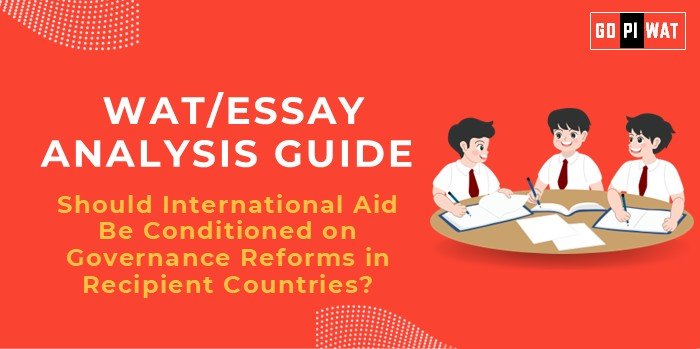📋 WAT/Essay Analysis Guide: Should International Aid Be Conditioned on Governance Reforms in Recipient Countries?
🌐 Understanding the Topic’s Importance
Governance-linked aid reflects a strategic shift in international aid policy to foster transparency and accountability. This topic interconnects global development, economics, and ethical considerations, offering a rich lens for B-school analysis.
📝 Effective Planning and Writing
- ⏱️ Time Allocation:
- Planning: 5 minutes
- Writing: 20 minutes
- Review: 5 minutes
💡 Introduction Techniques for Essays
- ⚖️ Contrast Approach: “Despite $223.7 billion in aid in 2023, the $1.4 trillion SDG funding gap underscores the urgent need to optimize aid through governance reforms.”
- 🔧 Solution-Based: “By tying aid to governance reforms, donors aim to address corruption and mismanagement, yet the approach demands a delicate balance with sovereignty concerns.”
📚 Structuring the Essay Body
🏆 Achievements
- ✅ Success Stories: Rwanda demonstrates how governance-linked aid fosters institutional resilience and sustainable development.
⚠️ Challenges with Comparative Analysis
- 📉 Failures: Afghanistan’s aid dependency highlights risks from corruption and weak enforcement.
🔮 Future Outlook
- 📜 Propose flexible frameworks with tailored governance benchmarks and recipient-country collaboration.
📄 Concluding Effectively
- ⚖️ Balanced Conclusion: “Governance-linked aid offers significant potential but requires thoughtful design to balance long-term reforms with immediate relief needs.”
- 🌍 Global Comparison: “Estonia’s governance reforms offer a template for success, whereas Afghanistan’s struggles reveal the risks of misaligned aid frameworks.”
📊 Analyzing Successes and Shortcomings
🌟 Key Achievements
- ✅ Effective reform in Rwanda demonstrates the transformative potential of governance-linked aid.
⚠️ Ongoing Challenges
- ⚖️ Sovereignty conflicts arise when aid conditions are seen as external impositions.
- 🛑 Corruption in fragile states undermines reform efforts.
🌍 Global Context
- ✨ Lessons from Estonia’s multilateral aid success.
- ❌ Failures in Afghanistan highlight implementation pitfalls.
✨ Recommendations for Sustainable Progress
- 📌 Implement tailored benchmarks for governance reform.
- 🤝 Enhance recipient country participation in setting conditions.
- 🌐 Strengthen multilateral frameworks to ensure accountability.
✍️ Sample Short Essays
⚖️ Balanced Perspective:
“Governance-linked aid fosters accountability but requires adaptation to local contexts to address development challenges effectively.”
💡 Solution-Oriented:
“Tailored governance benchmarks and collaborative aid frameworks can optimize the impact of conditional aid.”
🌍 Global Comparison:
“While Estonia demonstrates the potential of governance-linked aid, Afghanistan highlights the pitfalls of weak enforcement in fragile contexts.”


